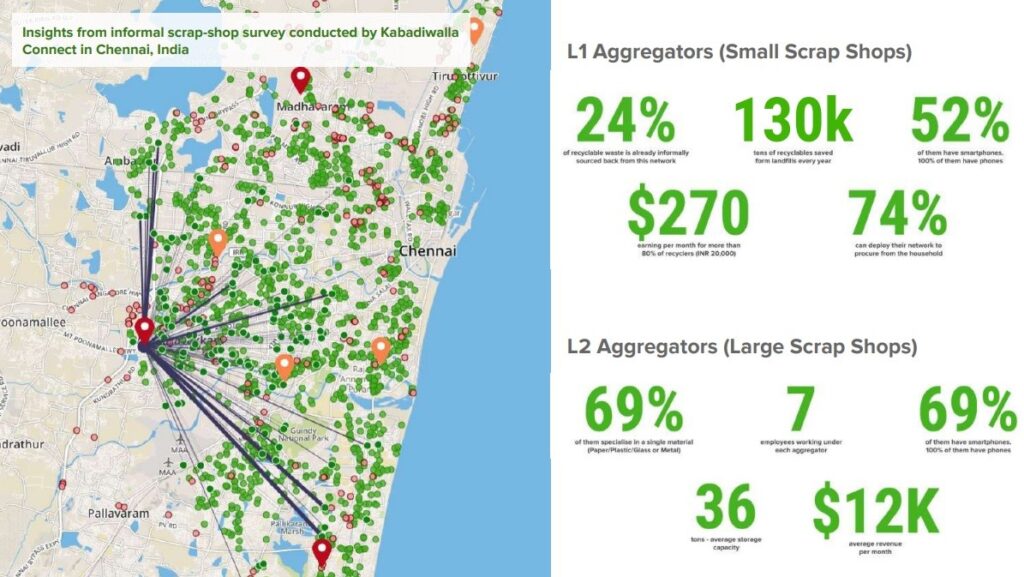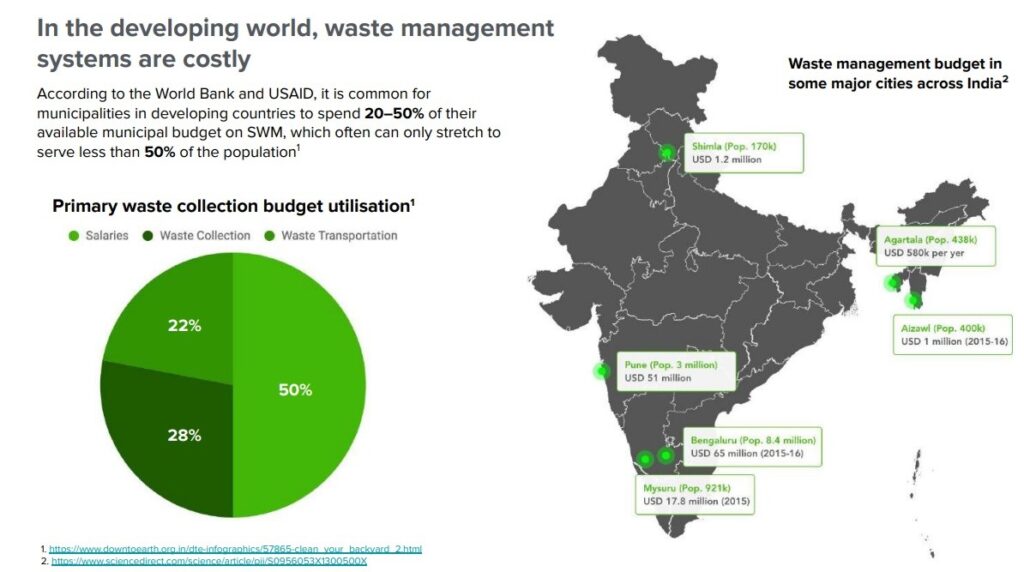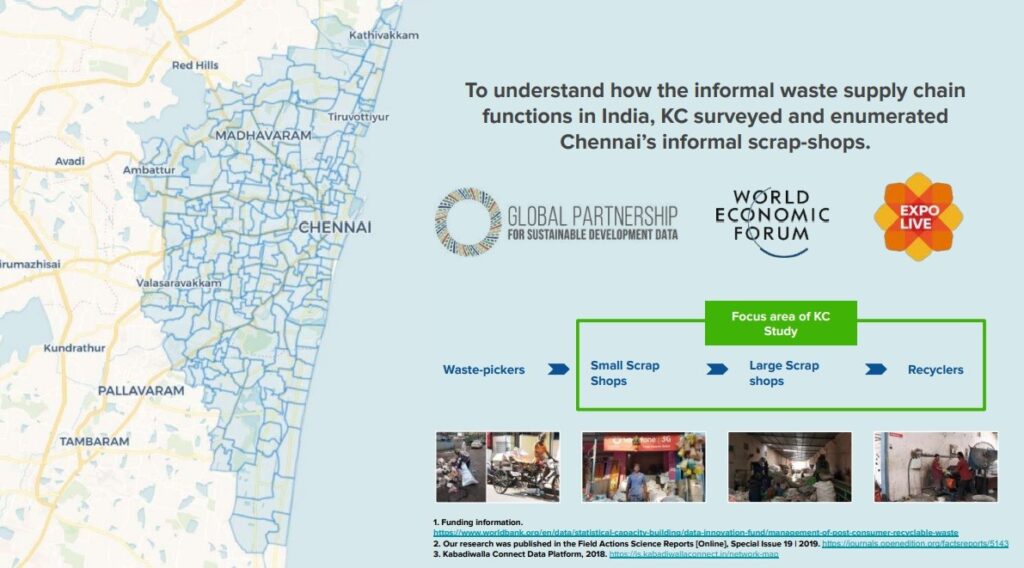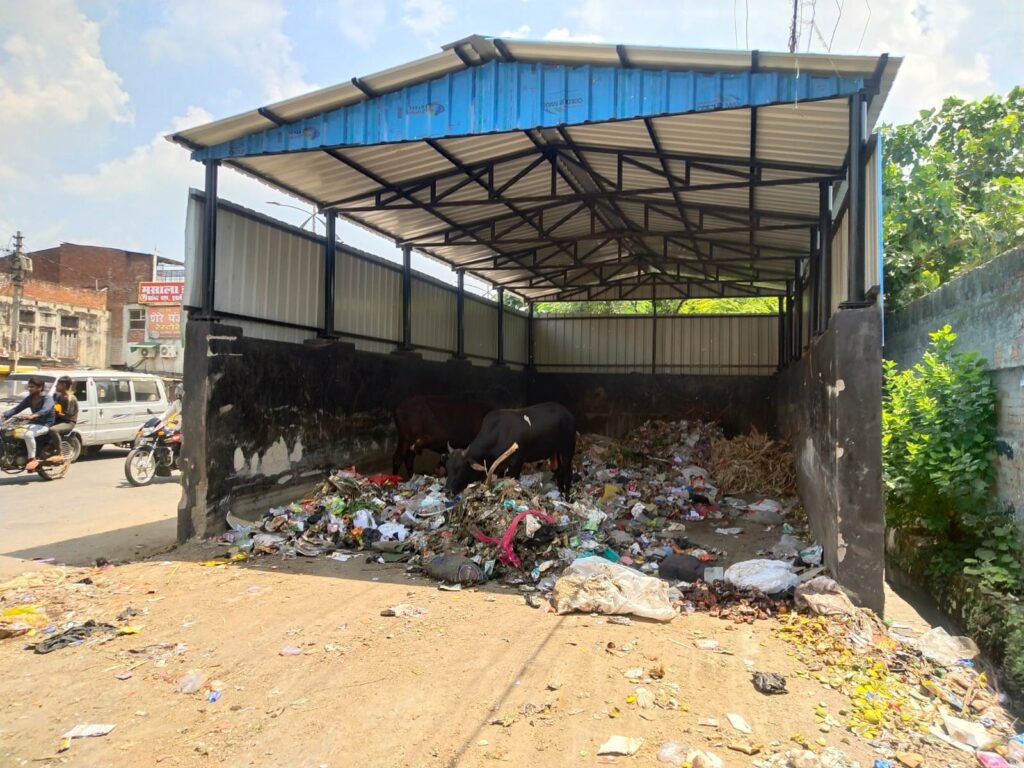India generated an estimated 55 million Metric Tonnes (MMT) of Municipal Solid Waste from its urban areas in 2020-21,[1] and it is expected to grow to 165 MMT by 2030. With unplanned urbanisation being a tangible risk (3892 of the 7933 urban settlements in India are census towns according to the 2011 census, with populations of at least 5,000 each), this estimate is likely to be on the lower side. How does one tackle this iceberg of waste heading surely and not slowly towards the Titanic that our urban settlements are in danger of becoming? Siddharth Hande, the founder and CEO of Kabadiwalla Connect, believes the solution lies in integrating our informal waste management sector of waste pickers and Kabadiwallas (informal waste recycling shops), and his organisation has the data to back up this claim.

The informal sector has a wide and undocumented presence in waste management in India. The Global Waste Pickers Alliance quotes a study saying that in Delhi alone, the number of waste pickers is around 100,000. Waste pickers form the foundation of this entire structure, but data is not easily available on their numbers on the national scale and the entire supply chain of waste. Estimates vary widely from 1.2 million to 4 million waste pickers, primarily women and children, who collect waste for a living. In 2015, Siddharth and team set out to remedy this problem of lack of data and therefore understanding of the informal waste sector, through a study in Chennai. As part of this study, Siddarth and his team mapped the entire supply chain of waste in the city through a census style data collection exercise and the findings were startling. The informal sector saved 130,000 tonnes of waste from landfills every year.

Apart from the sheer volume of waste that the informal sector handles, this also has the potential to result in significant cost savings. It is estimated that for every tonne of recyclable material collected and prevented from going to landfills, a major mechanism for disposal of waste in India, the local Municipality benefits from savings worth approximately INR 24,500.[1] For Indian ULBs with limited financial resources, this can be a means to financial sustainability, especially since government waste management solutions in developing countries, tend to be more expensive due to problems of waste segregation at source. However, the informal sector suffers from a lack of integration into the formal waste management system, which “…limits its involvement to a fraction of waste” despite its efficiency[2].

Building on the insights of the Chennai study, Kabadiwalla Connect now offers decentralised waste management solutions to developing countries, including India, Indonesia and others. The cornerstone of their approach is to leverage the efficiency of the informal sector in waste management and emphasise the health and safety issues of waste pickers by recognising them as stakeholders in the waste sector. Kabadiwalla Connect’s solutions recognise that the informal sector drives the waste recycling and collection systems in developing countries. The model uses ICT based solutions to map the entire waste ecosystem and deliver low-cost interventions by mobilising this sector. The team offers mapping, digitalisation, sourcing, and collection services for a data driven approach to waste management. These solutions remedy major gaps in the present waste management. Currently, waste management is the primary responsibility of the local government bodies under the Solid Waste Management Rules 2016. The Plastic Waste Management (Second Amendment) Rules, 2022 have introduced the idea of Extended Producer Responsibility, making the waste producer responsible for collection of the waste. In the field of e-waste, the E-Waste Management Rules 2016 has also designated a category of organisations as PROs (Producers Responsibility Organisation) to manage the waste of various producers. The entire informal waste sector lies outside this paradigm. In a city like Chennai, Kabadiwalla Connect’s study has identified four levels of organisations in this sector.

The waste pickers are the feet on the ground when it comes to waste collection. They collect high value recyclable material from small dumps, waste sites and landfills and sell it onwards to L1 scrap shops. People in this sector are often faced with health and safety risks while handling waste. Further, most waste pickers recycle only the highest value and easily recoverable material from sites, resulting in untapped value in waste. A level above this, the L1 scrap shops or Kabadiwalas are the cornerstone of the system. They buy waste and segregate it for onwards sale, also maintaining basic storage facilities. They undertake minimal processing, and their business model is based on aggregation and manual segregation. Siddarth feels that the Kabadiwalas recognised a business opportunity in the waste sector in metros very early, with the oldest shop being set up in Chennai around 60 years ago. They also collect waste from households and other small and medium waste generators at a low cost. At the next level the L2 scrap shops collect a single super category of material and also produce secondary raw materials. Finally, Processors make up the apex of the pyramid buying materials from both L1 and L2 aggregators and producing secondary raw materials for manufacturing.

Kabadiwala Connect’s solutions maps the flow of waste within urban agglomerations through this entire chain. In terms of digitalisation, all stakeholders are mapped, and volumes of waste are identified and onboarded to a digital dashboard. This then allows Siddarth and his team to offer solutions related to sourcing of particular types of waste and design efficient systems of waste collection. This approach presents opportunities that will streamline the waste management systems in our mega cities. First, the data collected through this approach, becomes a means to estimate the amount of waste generated in specific geographies, and evaluate any gaps in the facilities available. It can even provide an input to build targeted behavioural change interventions that motivate communities to reduce waste through a circular economic lifestyle. For urban planners, this data can provide valuable insights for spatial planning of growing settlements. Second, the Kabadiwalla Connect model mainstreams the activities of the most vulnerable population in the waste architecture, the waste pickers. Making this segment a part of the Municipality waste architecture, would do away with the need to deploy additional resources for waste collection. Recognising the fundamental role of waste pickers in waste management, would also enable capacity building, allowing them to handle the risks associated with their profession and utilize the potential of waste in large urban agglomerations. Often, the most marginalised and vulnerable sections of our population are disproportionately represented in this group. For example, in Chennai, the majority of waste pickers are women. Integrating this sector is thus an essential step towards the empowerment and welfare of these groups. Third, lack of formal recognition hampers the business efficiency of the Kabadiwalas. Connecting them to other stakeholders will permit identification of operational issues and better recovery of value from waste. Finally, Waste-to-Energy projects in India have often failed due to the nature of waste. This is particularly true for incineration plants, which need waste feed of higher calorific value than is available in India. Calorific value of Indian waste is estimated between 1,411 kcal/kg to 2,150 kcal/kg compared to a range of 1,900 kcal/kg to 3,800 kcal/kg for most western nations.[1] The amount of biodegradable waste in India, particularly in rural areas, is also estimated to be higher. However, in order to get a clear picture of the waste profile of a particular region or settlements needs detailed studies due to the wide variation between population density, lifestyles and spatial distribution of people. This gap in data can be addressed only through a mapping exercise similar to Kabadiwalla Connect’s interventions. Only then will it be possible to make informed decisions about waste-to-energy projects in a particular locality and suitable solutions.

Kabadiwalla Connect’s business offerings present a holistic solution to the problems of waste management. The use of technology enhances an understanding of how our society deals with waste and can provide valuable insights to policymakers and government bodies for building a more inclusive waste management system. The potential of these solutions has been recognised across developing countries, but in order to comprehensively tackle the problem of waste in India, the Kabadiwalla solutions need to be tested in diverse geographies within India. Siddharth has however, brought an important issue into focus – How to integrate the informal sector into Indian waste management and tap unrealised opportunities in waste? Kabadiwalla Connect offers a data-driven approach to address this issue.
[1] “Circular Economy in Municipal Solid and Liquid Waste” – Report by Ministry of Housing & Urban Development (2021)
[2] https://royalsocietypublishing.org/doi/10.1098/rsos.160764#d3e474
[3]“Circular Economy in Municipal Solid and Liquid Waste” – Report by Ministry of Housing & Urban Development (2021)
[4]https://scroll.in/article/1027554/waste-to-energy-plants-have-mostly-failed-in-india-and-yet-governments-are-building-more-of-them#:~:text=%E2%80%9CIndian%20waste%20has%20low%20calorific,kg%20and%203%2C800%20kcal%2Fkg.
Shantanu Pratap Singh is a civil servant and wildlife enthusiast